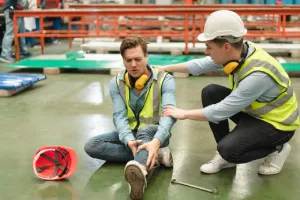RIDDOR (Reporting of Injuries, Diseases and Dangerous Occurrences Regulations) 2013
Accidents happen in every workplace, but how they are reported makes all the difference. The Reporting of Injuries, Diseases and Dangerous Occurrences Regulations 2013 (RIDDOR) is the law that requires certain incidents to be reported to the Health and Safety Executive (HSE).
For security officers, this is more than management jargon. You are often the first to witness slips, trips, and falls and your accurate recording of incidents ensures compliance, prevents future accidents, and demonstrates professionalism.

Think of it this way: every detail you write down could be the difference between your site being compliant—or your employer facing legal trouble.
What Falls Under RIDDOR?
Not every minor stumble is reportable. RIDDOR focuses on serious incidents, including those linked to slips, trips and falls. Examples include:
Specified injuries – fractures (other than fingers and toes), head injuries, loss of consciousness, or injuries requiring over 7 days off work.
Injuries to non-workers – if a visitor, contractor, or member of the public is injured and taken to hospital.
Dangerous occurrences – near misses where serious harm could easily have happened, e.g. broken flooring or a lighting failure causing unsafe conditions.
Did you know? HSE statistics show that slips, trips and falls are the single most common cause of workplace injury in the UK, accounting for over 30% of reported accidents each year.
Real-World Example
Imagine you’re patrolling a shopping centre when a customer slips on a spilled drink near the food court. They fall, hit their head, and are taken by ambulance to hospital.
This is a reportable incident under RIDDOR.
Your role:
Secure the area and make it safe.
Gather details (time, location, cause, witnesses).
Log the incident factually and escalate it to management.
Your notes form the foundation of the official RIDDOR submission. If you fail to record the incident properly, your employer may break the law.
What If RIDDOR Is Ignored?
Brushing RIDDOR aside isn’t just “forgetting paperwork”—it can create real problems:
For your employer: Expect possible fines, legal action, or a visit from the HSE. It can also damage the company’s reputation, especially if an accident makes the news.
For you: Poor or incomplete reports don’t just look unprofessional—they can raise questions about your competence and could affect how you’re viewed under SIA licensing standards.
For others: If incidents go unreported, the hazard stays in place. That means more colleagues, visitors, or members of the public could get hurt the next time around.
Bottom line: Failing to report isn’t harmless—it leaves people at risk, puts your employer in trouble, and dents your professionalism.
Tips for Security Officers – Staying RIDDOR Ready
- Be observant – Look for causes as well as the accident (wet floor? poor lighting?).
- Record clearly – Stick to facts: what you saw, when, and who was involved. Avoid assumptions.
- Escalate quickly – Don’t wait until the end of your shift. Report it immediately.
- Think about everyone on site – Staff, visitors, contractors: all count under RIDDOR.
- Don’t dismiss “minor” incidents – Today’s small slip could become tomorrow’s hospital visit.
Scenario for Reflection
While on night duty at an office building, you see a contractor trip over a loose cable. They fall heavily and later tell you they’ll be off work for two weeks with a fractured ankle.
Question: How should you respond?
A. Note it casually in the logbook.
B. Record full details, secure the scene, and escalate it to management for RIDDOR reporting.
C. Leave it to the contractor’s employer.
Correct Answer: B – Your accurate reporting ensures the law is followed and safety standards are improved.
Key Considerations for Security Officers
Stay professional with SIA standards – The SIA expects you to be accurate, detailed, and reliable in your reporting. RIDDOR isn’t separate from this—it’s part of showing you’re a professional officer.
Follow HSE’s golden rule – Facts, not guesses. The HSE stresses that clear, factual evidence is what keeps a report compliant and credible.
Remember audits and checks – Organisations like BSI and NSI regularly review how incidents are logged. That means your reports could be on the desk of an auditor, proving your site takes safety seriously.
Takeaway: Every report you complete is more than a form—it’s a reflection of your professionalism, your site’s reputation, and your commitment to safety.
Reporting Saves Lives
RIDDOR isn’t just “another bit of paperwork” — it’s a lifesaving system. Every time an incident is logged and reported, it creates a chance to fix hazards, learn lessons, and prevent the next accident.
Think of it this way:
That wet floor you reported today could prevent a colleague from breaking their ankle tomorrow.
That detailed log you completed might be the exact evidence that protects your employer in an HSE investigation.
That near miss you flagged could be the moment that stops a repeat accident from happening again.
As a security officer, you’re not only deterring crime—you’re also a frontline safety leader. People look to you to spot the dangers others miss. The way you handle slips, trips, and falls shows your commitment to professionalism and care for others.
Remember: slips, trips, and falls are the most common workplace accident in the UK, making up nearly a third of all reported injuries (HSE). Your actions genuinely matter in reducing those numbers.
That’s why accurate reporting isn’t just compliance—it’s your badge of professionalism. It shows that you take pride in protecting people, not only from threats at the door, but also from hazards under their feet.
Carry this mindset into every shift: when in doubt, report it. Because your words on a page today might be what saves someone’s wellbeing tomorrow.

